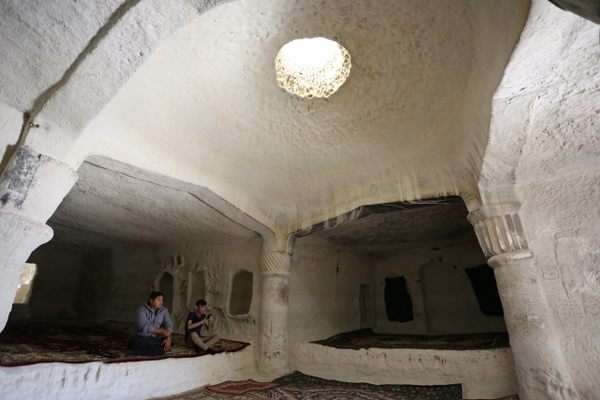Carved into a hillside from a single white chalk slab, the underground mosque of Shakpak Ata is a century-spanning collaboration across religions. It sits inside of a cave that would look at home on the moon. The porous cream-white cave bears the marks of its inhabitants, each group imprinting their own symbolism and composing their own legends within the wild desolation of the Kazakh steppe.
The interior is in the shape of a cross, inspired by the Christians, and the central point is carved out with a light well that illuminates the otherwise shadowy space. The four rock columns originate from the Zoroastrians, with each column corresponding to one of the elements of earth, wind, fire, and water. Etched into the walls are inscriptions in the Farsi, Arabic, and Turkic languages, including a Sufi poem. Drawings of horses and a hamsa, the hand of Fatima, are recognizable symbols of the Islamic faith.
The name Shakpak Ata means “father-flint” and originates from either the flint deposits found nearby the cave or, as the legend goes, in honor of the infamous Shakpak Ata, a powerful warrior with an illustrious career who lived out his last years as a cave-dwelling hermit. Alternative accounts describe the cave as the home of an ancient healer, attracting pilgrims searching for solace and a cure for their ills through sacred ritual and dance. Today, the mosque is considered a valuable artifact of Kazakhstan’s religious heritage and an archeological treasure that continues to attract pilgrims of all backgrounds.
The mosque is a respite from the harsh conditions of the boundless desert steppe, and inside the cave is cool and calm, the chilled air heavy with the weight of the countless souls that have set foot within these walls. Outside, a stairway leads to a panorama of the surrounding canyon, with views of the necropolis and modest lodgings for visitors.

